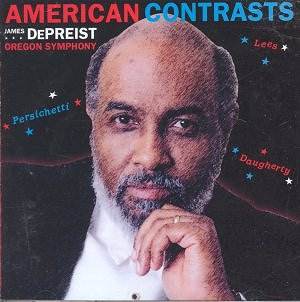Lees' Passaglia is a compact work.
At just over 11 minutes it is about the length of a standard concert
overture. It has more gravitas than the conventional opener. Lees
states the theme deep in the bass and then has the orchestra elaborate
either lugubrious or with murderous sincerity. The groundswell
of the bass theme remains a constant. The music has a Bach-like
weightiness of expression. There is nothing of obvious brilliance.
If anything this music has parallels with Rubbra and certain Bliss
works including the John Blow Meditations.
In the 1940s Vincent Persichetti proved
musically receptive to a slew of influences. Bartók appears
time and again. Listen to the repeated tributes to Concerto
for Orchestra. Bartók is not alone. We can also hear
Copland and Roy Harris. The stabbing pungent brass and percussion
figures in parts of the third movement point towards Schuman.
We are left in no doubt that DePreist has a virtuoso orchestra
at his bidding.
The Iowan composer, Michael Daugherty will
be fifty next year, no longer the young lion. His credentials
are salty and provocative, a student of computer music with Boulez
at IRCAM in Paris, of jazz with Gil Evans and with Ligeti
in Hamburg. With such forebears you might have expected his two
pieces to be avant-garderie of the plink-plunk school. Nothing
of the sort. The Sundown piece is an attractive amalgam
of commercial music, latino high stepping, big city jazz, cinema
grandeur and serenity. The infusions of popular culture are well
resolved into the texture with the two guitar interventions masterfully
done. This made me think of Eshpai's ballet The Circle (Albany).
The Hell's Angels piece is a concerto
for three bassoons, contrabassoon and orchestra. It was commissioned
by the Philharmonia. It starts with the threatening and dissolute
sounds of a Hell's Angels' gang and burbles its way through. As
this piece progresses you become increasingly aware of two facets
of the Daugherty 'signature': lucid orchestration that strips
back from grand effect to microcosmic fantasy, delicate romantic
facility and grand rumba shindigs like those in Malcolm Arnold's
Fourth and Sixth Symphonies.
Rob Barnett
